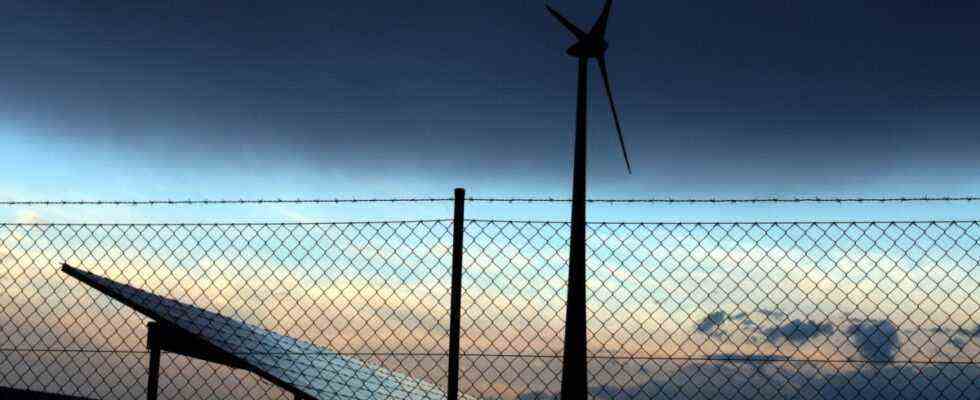The proclamation of the new begins with a reference to the old. Ten years ago, the Association of Bavarian Economy (VBW) presented a “Monitoring of the Energy Transition” for the first time. The conclusion at the time: The turnaround is limping. On Wednesday, the lobby association published its tenth annual report – once again the energy transition is “largely” stagnating, says chief executive Bertram Brossardt. “We talked too long and did too little.”
Too slow, too desperate, too cerebral: the state of the energy transition is often given such attributes. Time is of the essence. Prime Minister Markus Söder (CSU) promised last summer that the last nuclear power plants will be taken off the grid at the end of the year, the coal phase-out should best be achieved in 2030 and Bavaria will even be climate-neutral by 2040: “Renewable energies must have right of way.” This is what it says in Söder’s government statement.
However, if you follow the new VBW report, this priority road needs additional lanes so that it can accelerate. The study was carried out by Prognos, the data comes from the Corona year 2020. According to this, renewable energies in Bavaria contributed 53 percent to electricity generation at the time. That was more than in the previous year and, in the long term, too little to achieve the target of around 70 percent for the year 2025 that was once set in the Bavarian energy program.
Even when expanding the power grid, reality and demands do not go hand in hand. The construction of the large lines that will bring electricity from northern Germany to Bavaria is progressing slowly. According to the study, security of supply was still guaranteed, but comparatively expensive: Interventions in the system and security measures are valued at 1.4 billion euros, more than ever. The study therefore rates the situation in this area for Bavaria as “moderately satisfactory”. Or to put it less diplomatically: “When it comes to security of supply, we are in a very critical assessment of the issue of networks,” says author Almuth Kirchner.
Federal Minister of Economics Robert Habeck wants to overturn the 10-H rule
The VBW sees the Free State, the federal government and the EU as having an equal duty to drive the energy transition. Among other things, Brossardt calls for lower electricity prices. In addition, the “overdue expansion offensive” for routes and renewable energies must start. Approval processes had to be freed of bureaucracy and modernized, solar systems on every suitable roof and the distance rule for wind turbines abolished. “Unfortunately, we have to realize that the 10-H control was a failure,” says Brossardt: “So we don’t need it any more.”
The state government has so far found it difficult to abolish the particularly strict distance rule in Bavaria. More precisely: the CSU. Because Federal Economics Minister Robert Habeck (Greens) indicated in his package of climate measures to overturn the requirement, the Bavarian Greens now see Söder under pressure to act. The CSU had “maneuvered itself into a dead end,” said Green leader Thomas von Sarnowski. “The booklet of action” at 10 H is now in Berlin, “in Bavarian: Obersticht Unter”. The Greens in the state parliament, on the other hand, see VBW monitoring as a “red card” for Bavaria. The energy policy spokesman Martin Stümpfig called for a “completely renovated climate law”. Gerd Mannes (AfD) sees Habeck’s initiative differently: The state government can “now show whether it is opposed to these radical planned economy plans or whether it buckles”.
There remains the concern of electricity bottlenecks. This has been a concern for entrepreneurs for a long time – especially in those industries that expect increasing energy requirements in order to decarbonise themselves and their products. Take petrochemicals, for example: By 2030, twice as much electricity will be required as today, estimates Bernhard Langhammer, spokesman for Chem-Delta Bavaria, the amalgamation of companies based in the chemical triangle of Burghausen. In simple terms, moving to and producing more sustainable refined products consumes more energy. Just to meet the demand for green kerosene at Munich Airport, “you would need around 4600 wind turbines,” says Langhammer – or 660 square kilometers of photovoltaic areas.
Hydrogen is seen as a bearer of hope
As is well known, the Bavarian Ministry of Economic Affairs and Energy would have no objection to the end of 10 H, on the subject there is dissent between the CSU and Free Voters. Otherwise, according to a statement by Minister Hubert Aiwanger (FW), they see themselves on the right track: They allow “no compromises” on the “Bavarian security of supply, which is excellent even in an international comparison”. According to the analyzes so far, no bottlenecks are to be expected, and new gas-fired power plants were also connected to the grid for critical situations this year. The routes Südlink and Südostlink are approved by the Federal Network Agency, delays are not to be sought in Bavaria. When it comes to renewable energies, the Free State has “by far the largest expansion” of plants compared with other federal states.
The extent to which the use of hydrogen can advance the energy transition was only marginally examined in the Prognos study. The energy source is seen as a beacon of hope for making industry and mobility more climate-friendly. So far, however, there is hardly anything presentable. “Great plans, but we’re not quite ready to implement them yet,” says Kirchner. For Brossardt, too, hydrogen is more of an issue from 2030 onwards, not until 2030. Until then, everything has to be “scraped together” that is available to generate energy.

